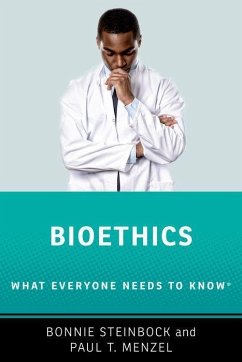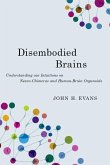Bonnie Steinbock (Professor Emerita of the Department of Philosophy, Paul T. Menzel (Professor of Phil Professor of Philosophy Emeritus
Bioethics
What Everyone Needs to Know ®
11,99 €
inkl. MwSt.
Sofort lieferbar

6 °P sammeln
Bonnie Steinbock (Professor Emerita of the Department of Philosophy, Paul T. Menzel (Professor of Phil Professor of Philosophy Emeritus
Bioethics
What Everyone Needs to Know ®
- Broschiertes Buch
- Merkliste
- Auf die Merkliste
- Bewerten Bewerten
- Teilen
- Produkt teilen
- Produkterinnerung
- Produkterinnerung
The questions and dilemmas of bioethics touch everyone. Bioethics: What Everyone Needs to Know RG discusses the most difficult and controversial bioethical issues facing the public today, providing a way to think about them in a rigorous and thoughtful way. Topics include the philosophical and historical foundations of bioethics, advance directives, experimentation on human subjects, the definition of death, physician-assisted dying, abortion, disability, just healthcare systems, the allocation of scarce resources, pharmaceutical drug pricing, assisted reproductive technology, egg donation,…mehr
Andere Kunden interessierten sich auch für
![Debating Surrogacy Debating Surrogacy]() Anca Gheaus (Assistant Professor, Assistant Professor, Central EuroDebating Surrogacy20,99 €
Anca Gheaus (Assistant Professor, Assistant Professor, Central EuroDebating Surrogacy20,99 €![Better Never To Have Been Better Never To Have Been]() David Benatar (University of Cape Town)Better Never To Have Been37,16 €
David Benatar (University of Cape Town)Better Never To Have Been37,16 €![The Routledge Handbook of Feminist Bioethics The Routledge Handbook of Feminist Bioethics]() The Routledge Handbook of Feminist Bioethics226,99 €
The Routledge Handbook of Feminist Bioethics226,99 €![Disembodied Brains Disembodied Brains]() John H. Evans (Professor, Professor, University of California, SanDisembodied Brains22,99 €
John H. Evans (Professor, Professor, University of California, SanDisembodied Brains22,99 €![The Immortal Life of Henrietta Lacks The Immortal Life of Henrietta Lacks]() Rebecca SklootThe Immortal Life of Henrietta Lacks9,99 €
Rebecca SklootThe Immortal Life of Henrietta Lacks9,99 €![The Immortal Life of Henrietta Lacks The Immortal Life of Henrietta Lacks]() Rebecca SklootThe Immortal Life of Henrietta Lacks9,99 €
Rebecca SklootThe Immortal Life of Henrietta Lacks9,99 €![The Ecology Book The Ecology Book]() DKThe Ecology Book17,99 €
DKThe Ecology Book17,99 €-
-
-
The questions and dilemmas of bioethics touch everyone. Bioethics: What Everyone Needs to Know RG discusses the most difficult and controversial bioethical issues facing the public today, providing a way to think about them in a rigorous and thoughtful way. Topics include the philosophical and historical foundations of bioethics, advance directives, experimentation on human subjects, the definition of death, physician-assisted dying, abortion, disability, just healthcare systems, the allocation of scarce resources, pharmaceutical drug pricing, assisted reproductive technology, egg donation, surrogate motherhood, sex selection, and the genetic modification of humans. Race and gender are considered throughout, as are ethical issues raised by pandemics.
Hinweis: Dieser Artikel kann nur an eine deutsche Lieferadresse ausgeliefert werden.
Hinweis: Dieser Artikel kann nur an eine deutsche Lieferadresse ausgeliefert werden.
Produktdetails
- Produktdetails
- WHAT EVERYONE NEEDS TO KNOW
- Verlag: Oxford University Press Inc
- Seitenzahl: 328
- Erscheinungstermin: 6. April 2023
- Englisch
- Abmessung: 209mm x 142mm x 27mm
- Gewicht: 354g
- ISBN-13: 9780197657966
- ISBN-10: 0197657966
- Artikelnr.: 66753488
- Herstellerkennzeichnung
- Libri GmbH
- Europaallee 1
- 36244 Bad Hersfeld
- gpsr@libri.de
- WHAT EVERYONE NEEDS TO KNOW
- Verlag: Oxford University Press Inc
- Seitenzahl: 328
- Erscheinungstermin: 6. April 2023
- Englisch
- Abmessung: 209mm x 142mm x 27mm
- Gewicht: 354g
- ISBN-13: 9780197657966
- ISBN-10: 0197657966
- Artikelnr.: 66753488
- Herstellerkennzeichnung
- Libri GmbH
- Europaallee 1
- 36244 Bad Hersfeld
- gpsr@libri.de
Paul T. Menzel is Professor of Philosophy Emeritus at Pacific Lutheran University. He is the author of Strong Medicine: The Ethical Rationing of Health Care, and co-editor of Prevention vs. Treatment: What's the Right Balance? and Voluntarily Stopping Eating and Drinking: A Compassionate, Widely Available Option for Hastening Death. Bonnie Steinbock is Professor Emerita of the Department of Philosophy at the University at Albany. She is the author of Life Before Birth: The Moral and Legal Status of Embryos and Fetuses, the editor of the Oxford Handbook of Bioethics, and the co-editor of Ethical Issues in Modern Medicine: Contemporary Readings in Bioethics.
* Preface
* 1. What Are the Philosophical Foundations of Bioethics?
* What is "normative ethics"?
* What are some important moral theories for bioethics?
* How does utilitarian reasoning work?
* What principles are featured in Kantian ethics?
* What does Natural Law ethics contribute to bioethics?
* What is the "principles approach" to bioethics?
* Concluding thoughts
* 2. How Has the Shift from Paternalism to Autonomy Shaped Bioethics?
* What is paternalism in general?
* How do strong and weak paternalism differ?
* What is medical paternalism?
* What does autonomy mean in bioethics?
* What is informed consent?
* What was the significance of the Belmont Report?
* What historical forces led to the rejection of medical paternalism?
* Do the effects of serious illness justify medical paternalism?
* Do irrational choices justify medical paternalism?
* Does respect for cultural differences justify deception?
* How should doctors give bad news to patients?
* Is deception justified in some "hard cases"?
* How should bioethicists and health care professionals address racism?
* Concluding thoughts
* 3. Do Advance Directives Protect Patient Autonomy?
* What is an advance directive for medical care?
* What constitutes a relevant change of mind?
* What is the "then-self/now-self" problem?
* How have defenders of advance directives responded to this problem?
* Can advance directives accommodate the then-self/now-self problem?
* What communication challenges limit the use of advance directives?
* Summary observations
* 4. When Is Experimentation on Human Subjects Unethical?
* What principles for ethical research emerged in the Nuremberg Code?
* What notable experiments influenced the development of medical
research ethics?
* Are randomized clinical trials ethically questionable?
* When do placebo-control trials violate principles of medical ethics?
* How do international contexts affect the ethics of trials?
* When are "challenge" trials for new vaccines acceptable?
* When do exclusions and priorities unjustly affect disadvantaged
groups?
* Summary and concluding thoughts
* 5. How Should Death Be Defined and Determined?
* What is death?
* What is brain death?
* Are neurological criteria a better indicator of death?
* What are the practical advantages of neurological criteria?
* Are there scientific arguments in favor of brain death?
* What are the arguments against brain death?
* What is the significance of the case of Jahi McMath?
* What would happen if we gave up brain death?
* Should a higher-brain standard be adopted?
* Is death an event or a process - and does it matter?
* Concluding thoughts
* 6. Is Physician-Assisted Dying an Ethical Choice?
* What is euthanasia?
* What is the difference between voluntary and non-voluntary
euthanasia?
* What was the Nazi "euthanasia" program?
* What is self-administered physician-assisted dying?
* What is the equal protection argument for PAD?
* Where is self-administered PAD legal in the United States?
* What is the legal status of PAD elsewhere in the world?
* What are the moral arguments in favor of PAD?
* What are the moral arguments against PAD?
* Is PAD inconsistent with the physician's role?
* Would legalizing PAD undermine palliative care?
* Does legalizing PAD create a slippery slope?
* Is there really a need for PAD?
* Concluding thoughts
* 7. Is Abortion an Ethical Choice?
* What is the conservative view of the moral status of the unborn?
* Why do moderate conservatives think human life begins after
conception?
* Is abortion always wrong for conservatives?
* What is the liberal view of the moral status of the unborn?
* What is the potentiality principle?
* Does the person view justify infanticide?
* How does the "future-like-ours" theory offer a new approach to
abortion?
* How does the embodied minds view affect the debate?
* What are the implications of the interest view for abortion?
* How does the interest view support a gradualist approach?
* What about late abortions?
* What role does the right to bodily self-determination play?
* 8. What Are the Implications of the Disability Critique?
* What is prenatal testing (PT)?
* What is preimplantation genetic testing (PGT)?
* What is the purpose of PT and PGT?
* What is the DC's objection to selective abortion?
* What responses can be made to the DC?
* Can prenatal testing be regarded as a preventive measure?
* Does the choice of selective abortion display a bad parental
attitude?
* Concluding thoughts
* 9. What Ethical Issues Are Raised by Assisted Reproductive
Technology?
* How is infertility defined, and what are its causes?
* What medical procedures are used to treat infertility?
* What ethical arguments favor ART?
* Is adoption a better alternative than ART?
* What are the health risks of IVF to women?
* What are the health risks to offspring?
* Are the offspring at risk of psychological harm?
* Who should pay?
* Is using ART to create non-traditional families ethically acceptable?
* Does paying gamete donors or gestational carriers commodify
reproduction?
* Does payment exploit egg donors?
* Does payment exploit gestational carriers?
* Is the use of ART for medical sex selection ethical?
* What arguments support the use of ART for nonmedical sex selection?
* What are the arguments against nonmedical sex selection?
* Concluding thoughts
* 10. What Is Required for a Healthcare System to Be Just?
* What questions of justice arise in comparing healthcare systems?
* How do utilitarian views of justice apply to healthcare systems?
* What does an egalitarian view of justice require?
* What does libertarian justice imply for the choice of a system?
* How do "market failure" and "cost-shifting" affect health insurance?
* What is unfair free-riding?
* To what extent does free-riding affect arguments about insurance?
* Why is insurance dangerous, and how can that danger be addressed?
* What role does "public health" play in a just system?
* Can common ground be found in debates about healthcare systems?
* 11. How Can Scarce Resources Be Allocated Justly?
* Who should have priority for lifesaving organ transplants?
* In a pandemic, who should get care first?
* Should past behavior affect priority for care?
* Should priorities be adjusted for structural inequities of health?
* What priority, if any, should treatment have over prevention?
* What should be included in the basic minimum available to everyone?
* What is a "quality-adjusted life year" (QALY)?
* Is it ethical to use QALYs to allocate healthcare resources?
* Do "reference point" effects justify extra value at the end of life?
* Concluding observation
* 12. What Is a Justified Price for Pharmaceutical Drugs?
* What is an ethically justified price?
* What costs of research and development justify price?
* Is market competition a good determinant of drug price?
* What makes it difficult to discern the true effectiveness of a drug?
* Should "value-based pricing" be used to determine price?
* What reforms are needed in markets and regulation?
* Is patent protection compatible with global justice?
* Concluding observation
* 13. Is It Ethical to Genetically Modify Humans?
* What is gene therapy?
* What is CRISPR?
* What safety concerns does CRISPR raise?
* Who was He Jiankui, and what did he do?
* What was unethical about what He Jiankui did?
* Can genetic modification of embryos to prevent disease be justified?
* What about enhancement?
* Does enhancement threaten authenticity?
* Does enhancement violate autonomy?
* Might enhancement be damaging to parent-child relationships?
* Are genes more deterministic than environmental influences?
* Is gene therapy worth the cost?
* Is genetic enhancement incompatible with social justice?
* Should we alter human evolution?
* Concluding thoughts
* Notes
* Further Reading
* Index
* 1. What Are the Philosophical Foundations of Bioethics?
* What is "normative ethics"?
* What are some important moral theories for bioethics?
* How does utilitarian reasoning work?
* What principles are featured in Kantian ethics?
* What does Natural Law ethics contribute to bioethics?
* What is the "principles approach" to bioethics?
* Concluding thoughts
* 2. How Has the Shift from Paternalism to Autonomy Shaped Bioethics?
* What is paternalism in general?
* How do strong and weak paternalism differ?
* What is medical paternalism?
* What does autonomy mean in bioethics?
* What is informed consent?
* What was the significance of the Belmont Report?
* What historical forces led to the rejection of medical paternalism?
* Do the effects of serious illness justify medical paternalism?
* Do irrational choices justify medical paternalism?
* Does respect for cultural differences justify deception?
* How should doctors give bad news to patients?
* Is deception justified in some "hard cases"?
* How should bioethicists and health care professionals address racism?
* Concluding thoughts
* 3. Do Advance Directives Protect Patient Autonomy?
* What is an advance directive for medical care?
* What constitutes a relevant change of mind?
* What is the "then-self/now-self" problem?
* How have defenders of advance directives responded to this problem?
* Can advance directives accommodate the then-self/now-self problem?
* What communication challenges limit the use of advance directives?
* Summary observations
* 4. When Is Experimentation on Human Subjects Unethical?
* What principles for ethical research emerged in the Nuremberg Code?
* What notable experiments influenced the development of medical
research ethics?
* Are randomized clinical trials ethically questionable?
* When do placebo-control trials violate principles of medical ethics?
* How do international contexts affect the ethics of trials?
* When are "challenge" trials for new vaccines acceptable?
* When do exclusions and priorities unjustly affect disadvantaged
groups?
* Summary and concluding thoughts
* 5. How Should Death Be Defined and Determined?
* What is death?
* What is brain death?
* Are neurological criteria a better indicator of death?
* What are the practical advantages of neurological criteria?
* Are there scientific arguments in favor of brain death?
* What are the arguments against brain death?
* What is the significance of the case of Jahi McMath?
* What would happen if we gave up brain death?
* Should a higher-brain standard be adopted?
* Is death an event or a process - and does it matter?
* Concluding thoughts
* 6. Is Physician-Assisted Dying an Ethical Choice?
* What is euthanasia?
* What is the difference between voluntary and non-voluntary
euthanasia?
* What was the Nazi "euthanasia" program?
* What is self-administered physician-assisted dying?
* What is the equal protection argument for PAD?
* Where is self-administered PAD legal in the United States?
* What is the legal status of PAD elsewhere in the world?
* What are the moral arguments in favor of PAD?
* What are the moral arguments against PAD?
* Is PAD inconsistent with the physician's role?
* Would legalizing PAD undermine palliative care?
* Does legalizing PAD create a slippery slope?
* Is there really a need for PAD?
* Concluding thoughts
* 7. Is Abortion an Ethical Choice?
* What is the conservative view of the moral status of the unborn?
* Why do moderate conservatives think human life begins after
conception?
* Is abortion always wrong for conservatives?
* What is the liberal view of the moral status of the unborn?
* What is the potentiality principle?
* Does the person view justify infanticide?
* How does the "future-like-ours" theory offer a new approach to
abortion?
* How does the embodied minds view affect the debate?
* What are the implications of the interest view for abortion?
* How does the interest view support a gradualist approach?
* What about late abortions?
* What role does the right to bodily self-determination play?
* 8. What Are the Implications of the Disability Critique?
* What is prenatal testing (PT)?
* What is preimplantation genetic testing (PGT)?
* What is the purpose of PT and PGT?
* What is the DC's objection to selective abortion?
* What responses can be made to the DC?
* Can prenatal testing be regarded as a preventive measure?
* Does the choice of selective abortion display a bad parental
attitude?
* Concluding thoughts
* 9. What Ethical Issues Are Raised by Assisted Reproductive
Technology?
* How is infertility defined, and what are its causes?
* What medical procedures are used to treat infertility?
* What ethical arguments favor ART?
* Is adoption a better alternative than ART?
* What are the health risks of IVF to women?
* What are the health risks to offspring?
* Are the offspring at risk of psychological harm?
* Who should pay?
* Is using ART to create non-traditional families ethically acceptable?
* Does paying gamete donors or gestational carriers commodify
reproduction?
* Does payment exploit egg donors?
* Does payment exploit gestational carriers?
* Is the use of ART for medical sex selection ethical?
* What arguments support the use of ART for nonmedical sex selection?
* What are the arguments against nonmedical sex selection?
* Concluding thoughts
* 10. What Is Required for a Healthcare System to Be Just?
* What questions of justice arise in comparing healthcare systems?
* How do utilitarian views of justice apply to healthcare systems?
* What does an egalitarian view of justice require?
* What does libertarian justice imply for the choice of a system?
* How do "market failure" and "cost-shifting" affect health insurance?
* What is unfair free-riding?
* To what extent does free-riding affect arguments about insurance?
* Why is insurance dangerous, and how can that danger be addressed?
* What role does "public health" play in a just system?
* Can common ground be found in debates about healthcare systems?
* 11. How Can Scarce Resources Be Allocated Justly?
* Who should have priority for lifesaving organ transplants?
* In a pandemic, who should get care first?
* Should past behavior affect priority for care?
* Should priorities be adjusted for structural inequities of health?
* What priority, if any, should treatment have over prevention?
* What should be included in the basic minimum available to everyone?
* What is a "quality-adjusted life year" (QALY)?
* Is it ethical to use QALYs to allocate healthcare resources?
* Do "reference point" effects justify extra value at the end of life?
* Concluding observation
* 12. What Is a Justified Price for Pharmaceutical Drugs?
* What is an ethically justified price?
* What costs of research and development justify price?
* Is market competition a good determinant of drug price?
* What makes it difficult to discern the true effectiveness of a drug?
* Should "value-based pricing" be used to determine price?
* What reforms are needed in markets and regulation?
* Is patent protection compatible with global justice?
* Concluding observation
* 13. Is It Ethical to Genetically Modify Humans?
* What is gene therapy?
* What is CRISPR?
* What safety concerns does CRISPR raise?
* Who was He Jiankui, and what did he do?
* What was unethical about what He Jiankui did?
* Can genetic modification of embryos to prevent disease be justified?
* What about enhancement?
* Does enhancement threaten authenticity?
* Does enhancement violate autonomy?
* Might enhancement be damaging to parent-child relationships?
* Are genes more deterministic than environmental influences?
* Is gene therapy worth the cost?
* Is genetic enhancement incompatible with social justice?
* Should we alter human evolution?
* Concluding thoughts
* Notes
* Further Reading
* Index
* Preface
* 1. What Are the Philosophical Foundations of Bioethics?
* What is "normative ethics"?
* What are some important moral theories for bioethics?
* How does utilitarian reasoning work?
* What principles are featured in Kantian ethics?
* What does Natural Law ethics contribute to bioethics?
* What is the "principles approach" to bioethics?
* Concluding thoughts
* 2. How Has the Shift from Paternalism to Autonomy Shaped Bioethics?
* What is paternalism in general?
* How do strong and weak paternalism differ?
* What is medical paternalism?
* What does autonomy mean in bioethics?
* What is informed consent?
* What was the significance of the Belmont Report?
* What historical forces led to the rejection of medical paternalism?
* Do the effects of serious illness justify medical paternalism?
* Do irrational choices justify medical paternalism?
* Does respect for cultural differences justify deception?
* How should doctors give bad news to patients?
* Is deception justified in some "hard cases"?
* How should bioethicists and health care professionals address racism?
* Concluding thoughts
* 3. Do Advance Directives Protect Patient Autonomy?
* What is an advance directive for medical care?
* What constitutes a relevant change of mind?
* What is the "then-self/now-self" problem?
* How have defenders of advance directives responded to this problem?
* Can advance directives accommodate the then-self/now-self problem?
* What communication challenges limit the use of advance directives?
* Summary observations
* 4. When Is Experimentation on Human Subjects Unethical?
* What principles for ethical research emerged in the Nuremberg Code?
* What notable experiments influenced the development of medical
research ethics?
* Are randomized clinical trials ethically questionable?
* When do placebo-control trials violate principles of medical ethics?
* How do international contexts affect the ethics of trials?
* When are "challenge" trials for new vaccines acceptable?
* When do exclusions and priorities unjustly affect disadvantaged
groups?
* Summary and concluding thoughts
* 5. How Should Death Be Defined and Determined?
* What is death?
* What is brain death?
* Are neurological criteria a better indicator of death?
* What are the practical advantages of neurological criteria?
* Are there scientific arguments in favor of brain death?
* What are the arguments against brain death?
* What is the significance of the case of Jahi McMath?
* What would happen if we gave up brain death?
* Should a higher-brain standard be adopted?
* Is death an event or a process - and does it matter?
* Concluding thoughts
* 6. Is Physician-Assisted Dying an Ethical Choice?
* What is euthanasia?
* What is the difference between voluntary and non-voluntary
euthanasia?
* What was the Nazi "euthanasia" program?
* What is self-administered physician-assisted dying?
* What is the equal protection argument for PAD?
* Where is self-administered PAD legal in the United States?
* What is the legal status of PAD elsewhere in the world?
* What are the moral arguments in favor of PAD?
* What are the moral arguments against PAD?
* Is PAD inconsistent with the physician's role?
* Would legalizing PAD undermine palliative care?
* Does legalizing PAD create a slippery slope?
* Is there really a need for PAD?
* Concluding thoughts
* 7. Is Abortion an Ethical Choice?
* What is the conservative view of the moral status of the unborn?
* Why do moderate conservatives think human life begins after
conception?
* Is abortion always wrong for conservatives?
* What is the liberal view of the moral status of the unborn?
* What is the potentiality principle?
* Does the person view justify infanticide?
* How does the "future-like-ours" theory offer a new approach to
abortion?
* How does the embodied minds view affect the debate?
* What are the implications of the interest view for abortion?
* How does the interest view support a gradualist approach?
* What about late abortions?
* What role does the right to bodily self-determination play?
* 8. What Are the Implications of the Disability Critique?
* What is prenatal testing (PT)?
* What is preimplantation genetic testing (PGT)?
* What is the purpose of PT and PGT?
* What is the DC's objection to selective abortion?
* What responses can be made to the DC?
* Can prenatal testing be regarded as a preventive measure?
* Does the choice of selective abortion display a bad parental
attitude?
* Concluding thoughts
* 9. What Ethical Issues Are Raised by Assisted Reproductive
Technology?
* How is infertility defined, and what are its causes?
* What medical procedures are used to treat infertility?
* What ethical arguments favor ART?
* Is adoption a better alternative than ART?
* What are the health risks of IVF to women?
* What are the health risks to offspring?
* Are the offspring at risk of psychological harm?
* Who should pay?
* Is using ART to create non-traditional families ethically acceptable?
* Does paying gamete donors or gestational carriers commodify
reproduction?
* Does payment exploit egg donors?
* Does payment exploit gestational carriers?
* Is the use of ART for medical sex selection ethical?
* What arguments support the use of ART for nonmedical sex selection?
* What are the arguments against nonmedical sex selection?
* Concluding thoughts
* 10. What Is Required for a Healthcare System to Be Just?
* What questions of justice arise in comparing healthcare systems?
* How do utilitarian views of justice apply to healthcare systems?
* What does an egalitarian view of justice require?
* What does libertarian justice imply for the choice of a system?
* How do "market failure" and "cost-shifting" affect health insurance?
* What is unfair free-riding?
* To what extent does free-riding affect arguments about insurance?
* Why is insurance dangerous, and how can that danger be addressed?
* What role does "public health" play in a just system?
* Can common ground be found in debates about healthcare systems?
* 11. How Can Scarce Resources Be Allocated Justly?
* Who should have priority for lifesaving organ transplants?
* In a pandemic, who should get care first?
* Should past behavior affect priority for care?
* Should priorities be adjusted for structural inequities of health?
* What priority, if any, should treatment have over prevention?
* What should be included in the basic minimum available to everyone?
* What is a "quality-adjusted life year" (QALY)?
* Is it ethical to use QALYs to allocate healthcare resources?
* Do "reference point" effects justify extra value at the end of life?
* Concluding observation
* 12. What Is a Justified Price for Pharmaceutical Drugs?
* What is an ethically justified price?
* What costs of research and development justify price?
* Is market competition a good determinant of drug price?
* What makes it difficult to discern the true effectiveness of a drug?
* Should "value-based pricing" be used to determine price?
* What reforms are needed in markets and regulation?
* Is patent protection compatible with global justice?
* Concluding observation
* 13. Is It Ethical to Genetically Modify Humans?
* What is gene therapy?
* What is CRISPR?
* What safety concerns does CRISPR raise?
* Who was He Jiankui, and what did he do?
* What was unethical about what He Jiankui did?
* Can genetic modification of embryos to prevent disease be justified?
* What about enhancement?
* Does enhancement threaten authenticity?
* Does enhancement violate autonomy?
* Might enhancement be damaging to parent-child relationships?
* Are genes more deterministic than environmental influences?
* Is gene therapy worth the cost?
* Is genetic enhancement incompatible with social justice?
* Should we alter human evolution?
* Concluding thoughts
* Notes
* Further Reading
* Index
* 1. What Are the Philosophical Foundations of Bioethics?
* What is "normative ethics"?
* What are some important moral theories for bioethics?
* How does utilitarian reasoning work?
* What principles are featured in Kantian ethics?
* What does Natural Law ethics contribute to bioethics?
* What is the "principles approach" to bioethics?
* Concluding thoughts
* 2. How Has the Shift from Paternalism to Autonomy Shaped Bioethics?
* What is paternalism in general?
* How do strong and weak paternalism differ?
* What is medical paternalism?
* What does autonomy mean in bioethics?
* What is informed consent?
* What was the significance of the Belmont Report?
* What historical forces led to the rejection of medical paternalism?
* Do the effects of serious illness justify medical paternalism?
* Do irrational choices justify medical paternalism?
* Does respect for cultural differences justify deception?
* How should doctors give bad news to patients?
* Is deception justified in some "hard cases"?
* How should bioethicists and health care professionals address racism?
* Concluding thoughts
* 3. Do Advance Directives Protect Patient Autonomy?
* What is an advance directive for medical care?
* What constitutes a relevant change of mind?
* What is the "then-self/now-self" problem?
* How have defenders of advance directives responded to this problem?
* Can advance directives accommodate the then-self/now-self problem?
* What communication challenges limit the use of advance directives?
* Summary observations
* 4. When Is Experimentation on Human Subjects Unethical?
* What principles for ethical research emerged in the Nuremberg Code?
* What notable experiments influenced the development of medical
research ethics?
* Are randomized clinical trials ethically questionable?
* When do placebo-control trials violate principles of medical ethics?
* How do international contexts affect the ethics of trials?
* When are "challenge" trials for new vaccines acceptable?
* When do exclusions and priorities unjustly affect disadvantaged
groups?
* Summary and concluding thoughts
* 5. How Should Death Be Defined and Determined?
* What is death?
* What is brain death?
* Are neurological criteria a better indicator of death?
* What are the practical advantages of neurological criteria?
* Are there scientific arguments in favor of brain death?
* What are the arguments against brain death?
* What is the significance of the case of Jahi McMath?
* What would happen if we gave up brain death?
* Should a higher-brain standard be adopted?
* Is death an event or a process - and does it matter?
* Concluding thoughts
* 6. Is Physician-Assisted Dying an Ethical Choice?
* What is euthanasia?
* What is the difference between voluntary and non-voluntary
euthanasia?
* What was the Nazi "euthanasia" program?
* What is self-administered physician-assisted dying?
* What is the equal protection argument for PAD?
* Where is self-administered PAD legal in the United States?
* What is the legal status of PAD elsewhere in the world?
* What are the moral arguments in favor of PAD?
* What are the moral arguments against PAD?
* Is PAD inconsistent with the physician's role?
* Would legalizing PAD undermine palliative care?
* Does legalizing PAD create a slippery slope?
* Is there really a need for PAD?
* Concluding thoughts
* 7. Is Abortion an Ethical Choice?
* What is the conservative view of the moral status of the unborn?
* Why do moderate conservatives think human life begins after
conception?
* Is abortion always wrong for conservatives?
* What is the liberal view of the moral status of the unborn?
* What is the potentiality principle?
* Does the person view justify infanticide?
* How does the "future-like-ours" theory offer a new approach to
abortion?
* How does the embodied minds view affect the debate?
* What are the implications of the interest view for abortion?
* How does the interest view support a gradualist approach?
* What about late abortions?
* What role does the right to bodily self-determination play?
* 8. What Are the Implications of the Disability Critique?
* What is prenatal testing (PT)?
* What is preimplantation genetic testing (PGT)?
* What is the purpose of PT and PGT?
* What is the DC's objection to selective abortion?
* What responses can be made to the DC?
* Can prenatal testing be regarded as a preventive measure?
* Does the choice of selective abortion display a bad parental
attitude?
* Concluding thoughts
* 9. What Ethical Issues Are Raised by Assisted Reproductive
Technology?
* How is infertility defined, and what are its causes?
* What medical procedures are used to treat infertility?
* What ethical arguments favor ART?
* Is adoption a better alternative than ART?
* What are the health risks of IVF to women?
* What are the health risks to offspring?
* Are the offspring at risk of psychological harm?
* Who should pay?
* Is using ART to create non-traditional families ethically acceptable?
* Does paying gamete donors or gestational carriers commodify
reproduction?
* Does payment exploit egg donors?
* Does payment exploit gestational carriers?
* Is the use of ART for medical sex selection ethical?
* What arguments support the use of ART for nonmedical sex selection?
* What are the arguments against nonmedical sex selection?
* Concluding thoughts
* 10. What Is Required for a Healthcare System to Be Just?
* What questions of justice arise in comparing healthcare systems?
* How do utilitarian views of justice apply to healthcare systems?
* What does an egalitarian view of justice require?
* What does libertarian justice imply for the choice of a system?
* How do "market failure" and "cost-shifting" affect health insurance?
* What is unfair free-riding?
* To what extent does free-riding affect arguments about insurance?
* Why is insurance dangerous, and how can that danger be addressed?
* What role does "public health" play in a just system?
* Can common ground be found in debates about healthcare systems?
* 11. How Can Scarce Resources Be Allocated Justly?
* Who should have priority for lifesaving organ transplants?
* In a pandemic, who should get care first?
* Should past behavior affect priority for care?
* Should priorities be adjusted for structural inequities of health?
* What priority, if any, should treatment have over prevention?
* What should be included in the basic minimum available to everyone?
* What is a "quality-adjusted life year" (QALY)?
* Is it ethical to use QALYs to allocate healthcare resources?
* Do "reference point" effects justify extra value at the end of life?
* Concluding observation
* 12. What Is a Justified Price for Pharmaceutical Drugs?
* What is an ethically justified price?
* What costs of research and development justify price?
* Is market competition a good determinant of drug price?
* What makes it difficult to discern the true effectiveness of a drug?
* Should "value-based pricing" be used to determine price?
* What reforms are needed in markets and regulation?
* Is patent protection compatible with global justice?
* Concluding observation
* 13. Is It Ethical to Genetically Modify Humans?
* What is gene therapy?
* What is CRISPR?
* What safety concerns does CRISPR raise?
* Who was He Jiankui, and what did he do?
* What was unethical about what He Jiankui did?
* Can genetic modification of embryos to prevent disease be justified?
* What about enhancement?
* Does enhancement threaten authenticity?
* Does enhancement violate autonomy?
* Might enhancement be damaging to parent-child relationships?
* Are genes more deterministic than environmental influences?
* Is gene therapy worth the cost?
* Is genetic enhancement incompatible with social justice?
* Should we alter human evolution?
* Concluding thoughts
* Notes
* Further Reading
* Index







